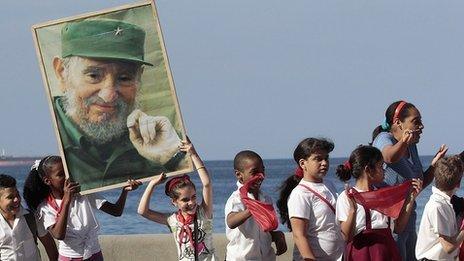How will Cuba get off the state-sponsored terrorism list?
- Published
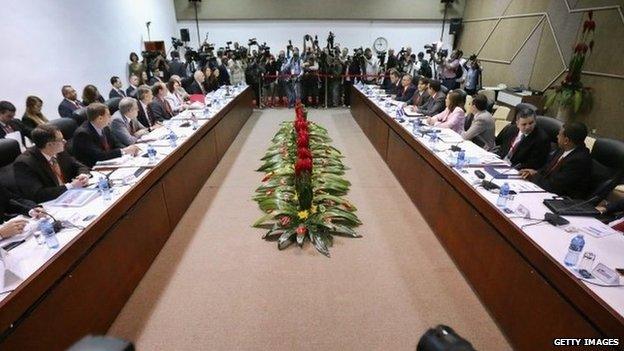
The negotiations have ended with a promise to meet again this year
One of the paradoxes of the first round of negotiations between Cuba and the US is that Washington is hoping to establish diplomatic relations with a country it considers to be a sponsor of international terrorism.
Since March 1982, Cuba has been on a US state department list of countries that "have repeatedly provided support for acts of international terrorism".
The list is short, external - Iran, Sudan, Syria and Cuba.
The US believes Cuba has long provided a safe haven for members of the Basque separatist group ETA and Colombia's Farc guerrilla group, according to its 2013 Report on Terrorism, external.
But the Caribbean nation has frequently rejected its presence on the list, describing it as unfounded.
And now officials are stressing that it should be removed if negotiations with the United States are to move forward.
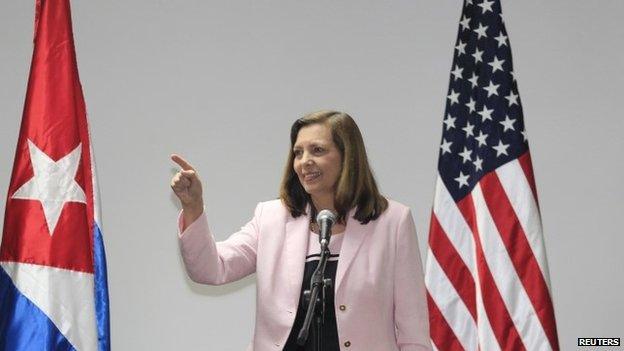
Cuba's Josefina Vidal has pushed for the US to drop the designation during the first set of talks
"We expressed the view that it would be difficult to explain that diplomatic relations have been resumed while Cuba is still unjustly listed as a state sponsor of international terrorism," said Josefina Vidal, who has represented the Cuban government in the negotiations.
The US government has said it has begun an intelligence review in order to evaluate whether Cuba can be removed from the list.
But it has described the matter as a separate issue to the opening of embassies, which has been Washington's main objective for these initial talks.
"This is the most relevant issue on the immediate agenda," says Arturo Lopez Levy, a scholar on Cuban issues at the University of Denver, in Colorado.
"Cuba has never accepted the US authority to include Cuba in a unilateral list of countries that sponsor terrorism," he tells the BBC.
"It has even said that it should never have been on that list, so it doesn't need to formally co-operate when it comes to being taken off it."
The state department has sanctioned the four countries on the list by banning certain exports or restricting US foreign assistance.
In Cuba's case, this does not change much, because the country is already affected by the embargo.
But unlike the embargo, which can only be lifted through an act of Congress, this decision is ultimately in the president's hands.
Mr Obama has used his executive authority to reduce the power of the embargo wherever he has been able to, and he recently unveiled a series of new travel and trade rules between the two countries.
Now it is possible that his next executive actions could include removing Cuba from the list.
He has asked the state department to complete a review process and present a recommendation to him within six months.
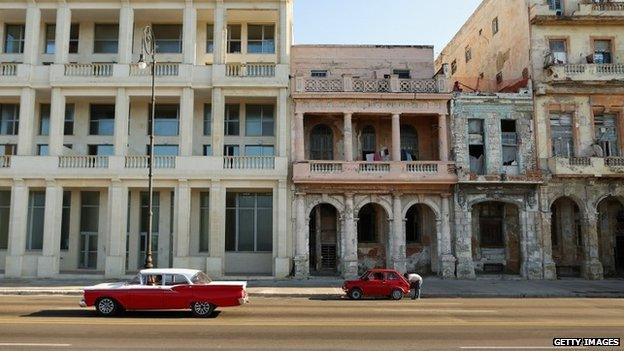
Dropping Cuba from the state sponsor of terrorism list would have some impact on the island
Once he receives it, he would have to submit a report to Congress 45 days before the new decision would take effect.
That report would have to first ensure that Cuba had not provided any support for international terrorism in the preceding six months, and then offer guarantees that it would not do so in the future.
Regarding the first element, even the state department has acknowledged that Cuba has made progress.
In its 2013 Report on Terrorism it highlighted how Cuba's links to ETA have become more distant and how it has been hosting negotiations between Colombia's government and Farc rebels.
It also mentioned how there has been no indication that the Cuban government "provided weapons or paramilitary training to terrorist groups".
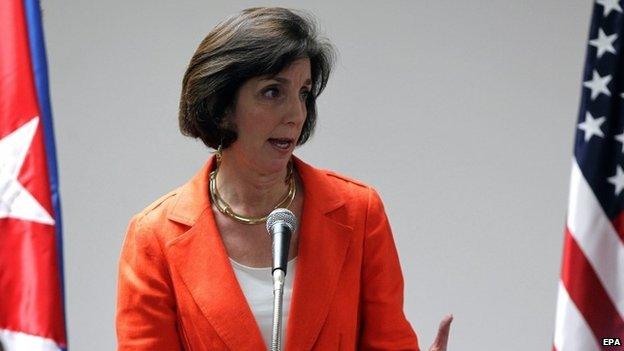
Roberta Jacobson is the highest ranking US official to visit in 30 years
The Caribbean island has remained on the list despite these actions, mainly because of political considerations, according to Geoff Thale, a Cuba analyst at the Washington Office on Latin America (Wola).
"With Alan Gross still in prison, the US administration wasn't willing to pay the political price of taking Cuba off the list," Mr Thale told the BBC.
With many of those political considerations out of the way, the main issue lies in finding a way for Cuba to guarantee that it will not support any acts of terrorism in the future.
"The diplomatic challenge is to find a formula that will enable Cuba to hand the United States information regarding those guarantees," says Arturo Lopez Levy.
If the two countries co-operate and Washington takes Cuba off the list, this will have concrete effects on the Caribbean island.
"Foreign banks, even when engaged in perfectly legal transactions with Cuba, are wary of getting investigated by the treasury department," says Mr Thale.
As the United States and Cuba pledge to normalise diplomatic ties, the BBC looks back at the relationship between the two countries through the decades.
"And so it will ease that burden, and that will be helpful for them, but it won't actually change any financial sanctions directed at Cuba."
Lopez Levy adds that it would be "another nail in the coffin of the embargo" and it would affect the "logic of Cuba as an enemy of the United States".
For the moment, though, Cuba remains on the list and the state department has preferred not to anticipate the outcome of its ongoing investigation.
- Published22 January 2015
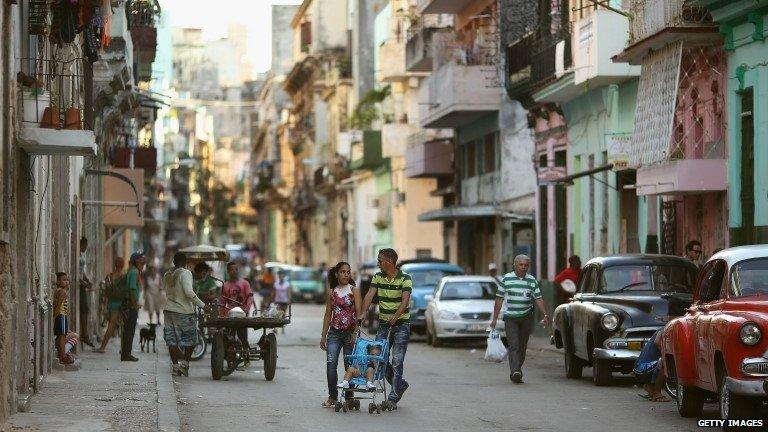
- Published14 August 2015
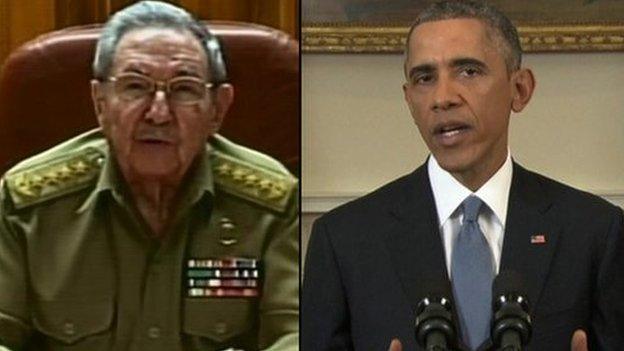
- Published19 December 2014
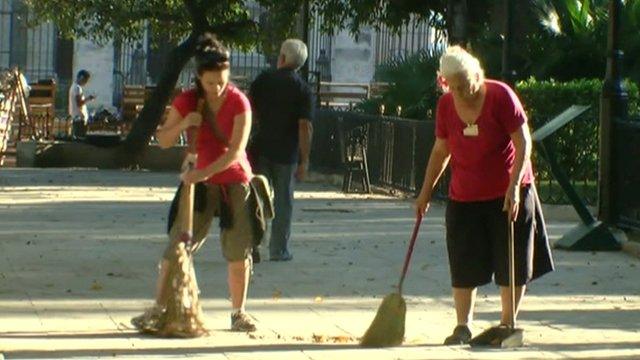
- Published11 January 2014
